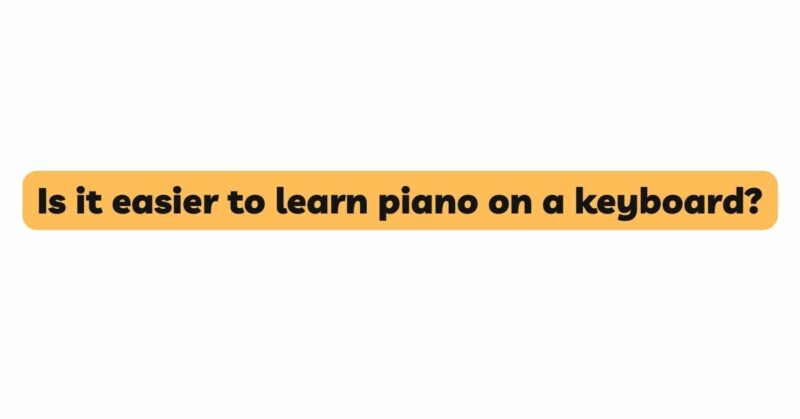Here are some factors to consider when deciding whether to learn piano on a keyboard or a piano:
- Cost: Keyboards are typically much more affordable than pianos. This is especially important if you are not sure if you want to commit to learning piano long-term.
- Portability: Keyboards are much more portable than pianos. This means that you can take your keyboard with you wherever you go, so you can practice piano whenever you want.
- Features: Many keyboards come with a variety of features that can help you learn piano, such as built-in lessons, accompaniment tracks, and metronomes. These features can make it easier to learn piano and can help you to improve your skills more quickly.
- Sound quality: The sound quality of keyboards has improved significantly in recent years. Some keyboards now offer a variety of sounds that can be used to play different genres of music.
- Feel: Keyboards with weighted keys can provide a similar feel to a piano, which can be helpful for developing finger strength and dexterity.
Is it easier to learn piano on a keyboard?
There is no definitive answer to this question, as it depends on the individual learner. Some people may find it easier to learn piano on a keyboard, while others may prefer to learn on a piano.
Here are some reasons why someone might find it easier to learn piano on a keyboard:
- Keyboards are typically much more affordable than pianos. This means that more people can afford to buy a keyboard, which can make it easier to find a teacher or take lessons.
- Keyboards are much more portable than pianos. This means that you can take your keyboard with you wherever you go, so you can practice piano whenever you want. This can be especially helpful for people who have busy schedules or who travel frequently.
- Keyboards come with a variety of features that can help you learn piano. Many keyboards come with built-in lessons, accompaniment tracks, and metronomes. These features can make it easier to learn piano and can help you to improve your skills more quickly.
- Keyboards with weighted keys can provide a similar feel to a piano. This can be helpful for developing finger strength and dexterity, which are important skills for piano players.
However, there are also some reasons why someone might find it more difficult to learn piano on a keyboard:
- Keyboards do not have the same acoustic sound quality as a piano. This can be a drawback for some people, as they may prefer the sound of a piano.
- Keyboards may not be as durable as pianos. This means that they may not last as long, which can be a concern for people who plan on playing piano for many years.
- Some people believe that learning piano on a keyboard can lead to bad habits that can be difficult to break if you ever switch to a piano. This is because keyboards typically have lighter keys than pianos, which can make it difficult to develop the finger strength and dexterity that are necessary for playing piano.
Ultimately, the decision of whether to learn piano on a keyboard or a piano is a personal one. There are pros and cons to both instruments, and the best option for you will depend on your individual circumstances and preferences.
If you are still unsure of whether to learn piano on a keyboard or a piano, I recommend talking to a piano teacher. They can help you to assess your individual needs and goals and make a recommendation that is right for you.
Here are some additional tips for learning piano on either a keyboard or a piano:
- Find a good teacher. A good teacher can help you to learn the basics of piano playing and can identify any bad habits that you may be developing.
- Practice regularly. The more you practice, the better you will become at playing piano. Aim to practice for at least 30 minutes a day, several times a week.
- Use a metronome. A metronome can help you to keep a steady beat, which is essential for playing piano well.
- Start with simple songs. Don’t try to learn too much too quickly. Start with simple songs and gradually work your way up to more complex pieces.
- Have fun! Learning piano should be enjoyable. If you’re not having fun, you’re less likely to stick with it.


